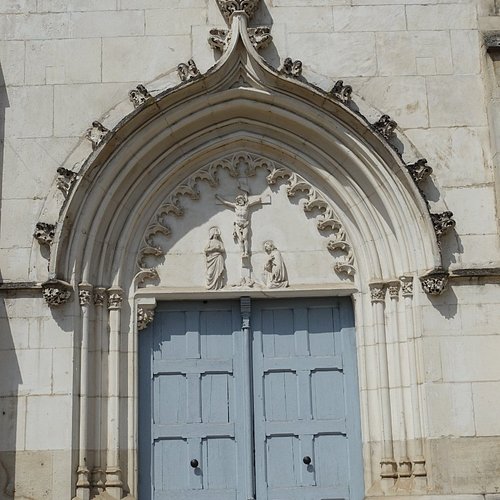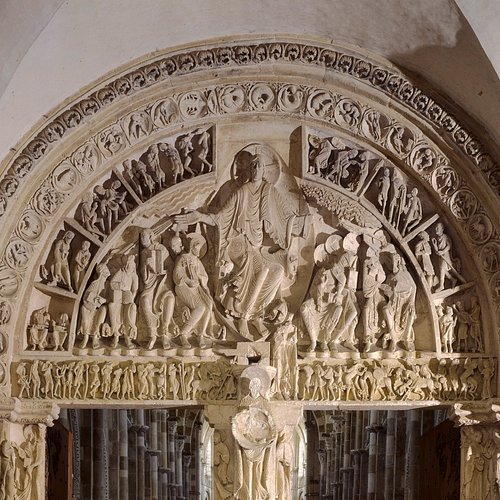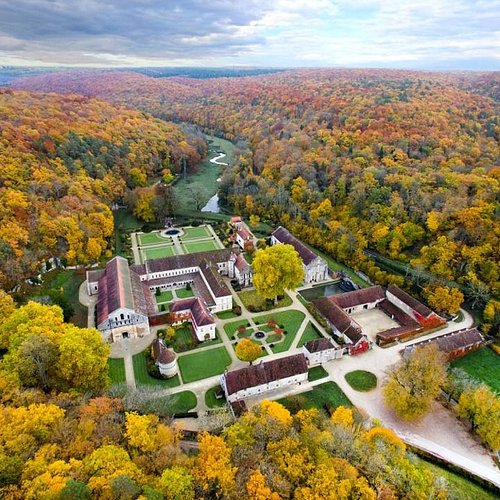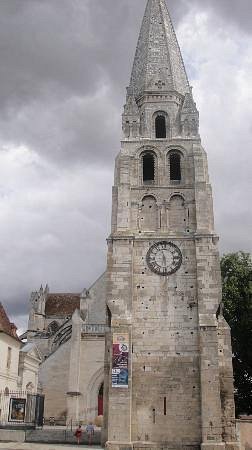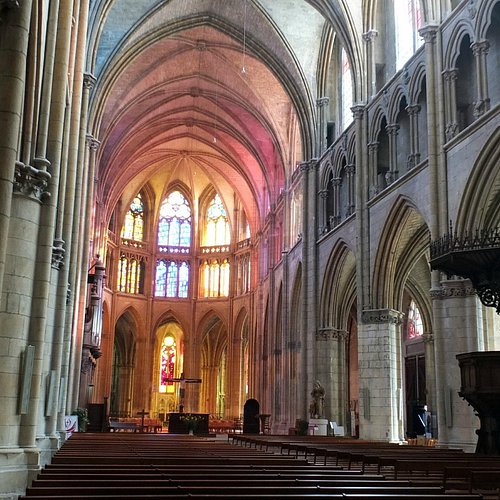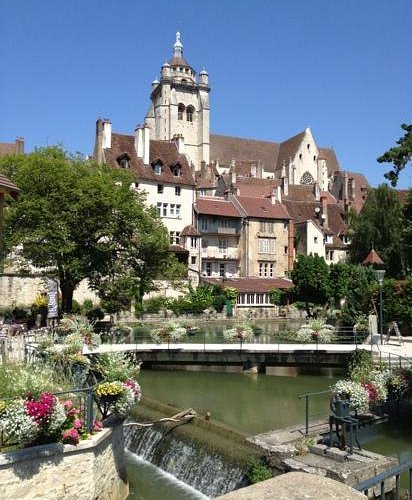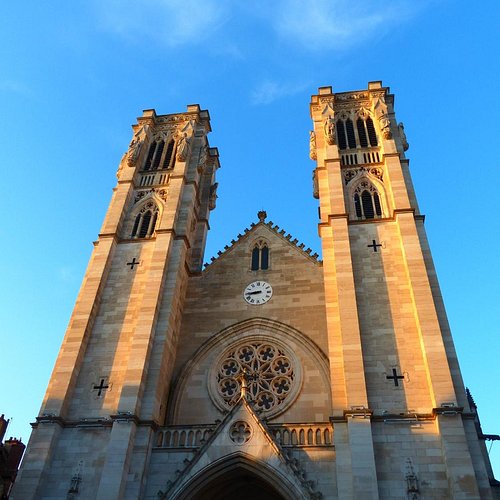10 Churches & Cathedrals in Bourgogne-Franche-Comte That You Shouldn't Miss
Bourgogne-Franche-Comté is a region of France created by the territorial reform of French Regions in 2014, from a merger of Burgundy and Franche-Comté.
Restaurants in Bourgogne-Franche-Comte
1. Eglise Saint-Clement de Macon
2. Basilique de Vezelay
Overall Ratings
4.5 based on 1,114 reviews
The Basilica and the relics of St. Mary Magdalene have made and continue to make of Vezelay a major spiritual destination. Vezelay has for centuries captured the imagination of people. Not only is the Basilica Church of St. Mary Magdalene a beacon for Christianity, it is also a place of major importance in history and in art history. It has as such recently been inscribed on the UNESCO World Heritage list. Vezelay was originally a monastic church, which it is now again while remaining a pilgrimage place. It has also been a parish church for some two centuries. The Basilica is a highly praised spiritual and tourist destination for all alike: believers, pilgrims or visitors.
Reviewed By claudiad38
One of the great roman cathedrals. Some renovations scaffolding when we visited. Daily evening and other services, don't miss.
3. Cathedrale Saint-Etienne
Overall Ratings
4.5 based on 448 reviews
Reviewed By phil2mlin - Northampton, United Kingdom
Visited the Cathedral in October 2019 whilst on a tour of the area. Auxerre is a very historic town and well worth stopping in and walking around. The Cathedral is situated high above the river and dominates the skyline. The detailed masonary is worth looking at as is the Crypt.
4. Abbaye de Fontenay
Overall Ratings
4.5 based on 900 reviews
The Abbey of Fontenay was founded by Saint Bernard in 1118. It is one of the oldest Cistercian abbeys in Europe. The Romanesque architecture offers a remarkable unity to all buildings remained intact since the Middle Ages. The Abbey was transformed into a paper mill after the French Revolution by the family Montgolfier and was bought back in 1906 by Edouard Aynard, the ancestor of the present owners who continue on safeguarding this masterpiece of Romanesque art. The old Abbey of Fontenay (12th century) was one of the first monuments to be inscribed on the Unesco world heritage list. This classification has distinguished the exceptional value of Fontenay and its environment. Free Parking and gift shop. Until 1/11/2020, Fontenay Abbey is open every day from 10 a.m. to 12 p.m. and from 2 p.m. to 5 p.m. Regular guided tours will take place only on weekends in French. From 02/11/2020 to 18/12/2020, only the week-end from 10 a.m. to 12 p.m. and from 2 p.m. to 5 p.m. and free tour only.
Reviewed By Carmen8889 - Bucharest, Romania
This was one of the highlights of my trip in Burgundy. The guided tour was very insightful, the site is very well kept and everyone is willing to help and provide any additional information. It is definitely a place to return!
5. Paroisse Notre-Dame De Dijon
Overall Ratings
4.5 based on 527 reviews
Early 13th-century gothic church features gargoyles and slender columns topped by the famous 14th-century Jacquemart Clock.
Reviewed By VadimM67 - Murmansk, Russia
The church of Notre Dame in its appearance is suitable for a cathedral. It was originally built in this capacity and was the home church for the inhabitants of the ducal palace. However, Saint-Benigne became a cathedral by the will of circumstances. However, the status of an ordinary church did not prevent Notre Dame from entering the World Heritage List in 2015. And all thanks to the western facade, which has no equal in French Gothic. Even if only it remained of the cathedral, it would be included in the World Heritage List, as happened with the facade of St. Paul's Cathedral in Macau. The 29-meter-high western facade attracts the eye with a contradictory combination of pointed arches on the first level and two rows of arcature galleries evoking memories of Venice with its Renaissance palaces. However, the idea does not fly away for a long time to the banks of the Grand Canal, because in the middle of the Renaissance arches we see quite Gothic gargoyles. Gargoyles as you know, in addition to intimidating, performed a much more important role as drains for cathedrals.However, the fake gargoyles that adorn the facade today are not medieval at all, but the result of the work of 7 Parisian sculptors from 1880 to 1882 during the restoration. Where did the real ones go? They were destroyed almost immediately after the completion of the work on Notre Dame in 1240. By the way, the church was built in a record-breaking 20 years for the Middle Ages. One of the moneylenders of Dijon decided to get married in the new church. And it must happen that a gargoyle depicting just moneylender fell from the facade and killed moneylender. Superstitious horror did not allow to return gargoyles back 6 centuries! In addition to the gargoyles, there are 3 other attractions in Dijon's Notre Dame. The first attraction is located inside, the second is at the top, and the third is located below. The statue of Our Lady of Bon Hope, or the Black Virgin, is located in the church. Le Jacquemart clock is located in the bell tower. The watch, brought as a trophy from the looted Flanders Kortrijk, consists of four metal automatons. Two , Jacquemart and Jacqueline, ring a large bell with a hammer. Two other automatons, their "children" Jacquelinet and Jacquelinette, strike from a quarter of an hour to a quarter of an hour, each with a small bell. It is necessary to climb up to this structure. But the third one is publicly available. This is the symbol of Dijon - the owl, which the tourists who believe in pagan habits have already erased. After all, touching it brings good luck. The experiment has been going on for many years with thousands of teachers, and the owl is being erased little by little...
6. Abbaye Saint-Philibert
Overall Ratings
4.5 based on 435 reviews
Reviewed By KevinJ540 - London, United Kingdom
A lovely Abbey that’s been well preserved by many hands over many years. Great Roman mosaic floor by the abse, too . Well worth an hour or two & a trip up the tower !
7. Abbaye de Saint-Germain d'Auxerre
Overall Ratings
4.5 based on 217 reviews
Reviewed By Googly2010 - Tonbridge, United Kingdom
Alas we opted not to pay to see the closed part of the crypt (with frescoes) and meanly walked around for nothing. Despite our loss, what we did see was fabulous, including parts of the excavated crypt dating back over 1000 years with stone coffins beneath our feet. The existing cloisters, chapter house and church, dating to the 13thC and later are well worth seeing. As usual we marvelled at the wealth and power of the medieval church with its lofty interior and beautiful stained glass. The adjoining museum houses some woderful Roman artefacts found in Auxerre and surroundings.
8. Cathedrale Saint-Cyr-et-Sainte-Julitte
9. Collegiale Notre-Dame de Dole
Overall Ratings
4.5 based on 273 reviews

